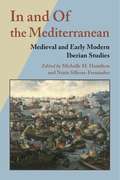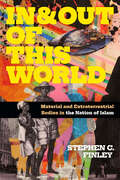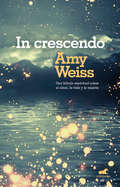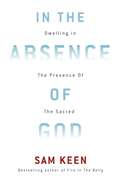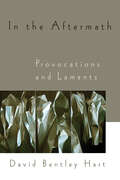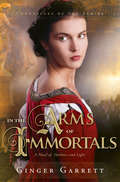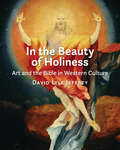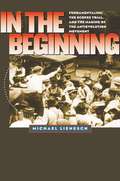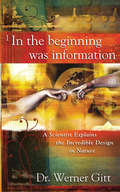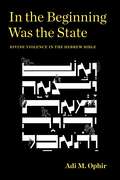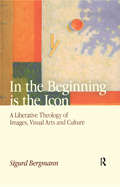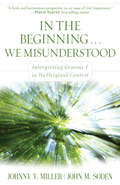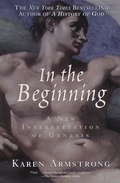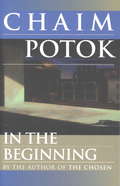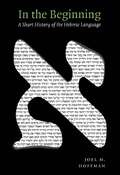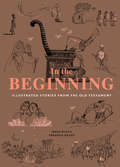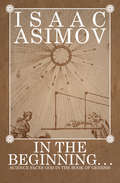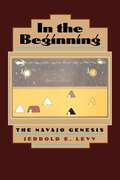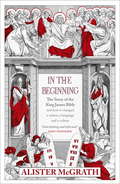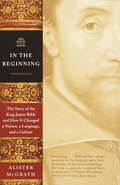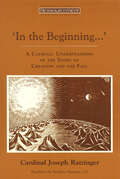- Table View
- List View
In and Of the Mediterranean: Medieval and Early Modern Iberian Studies (Hispanic Issues)
by Michelle M. Hamilton and Núria Silleras-FernándezThe Iberian Peninsula has always been an integral part of the Mediterranean world, from the age of Tartessos and the Phoenicians to our own era and the Union for the Mediterranean. The cutting-edge essays in this volume examine what it means for medieval and early modern Iberia and its people to be considered as part of the Mediterranean.
In and Out of This World: Material and Extraterrestrial Bodies in the Nation of Islam (Religious Cultures of African and African Diaspora People)
by Stephen C. FinleyWith In and Out of This World Stephen C. Finley examines the religious practices and discourses that have shaped the Nation of Islam (NOI) in America. Drawing on the speeches and writing of figures such as Elijah Muhammad, Malcolm X, Warith Deen Mohammad, and Louis Farrakhan, Finley shows that the NOI and its leaders used multiple religious symbols, rituals, and mythologies meant to recast the meaning of the cosmos and create new transcendent and immanent black bodies whose meaning cannot be reduced to products of racism. Whether examining how the myth of Yakub helped Elijah Muhammad explain the violence directed at black bodies, how Malcolm X made black bodies in the NOI publicly visible, or the ways Farrakhan’s discourses on his experiences with the Mother Wheel UFO organize his interpretation of black bodies, Finley demonstrates that the NOI intended to retrieve, reclaim, and reform black bodies in a context of antiblack violence.
In crescendo: Una fábula espiritual sobre el alma, la vida y la muerte
by Amy WeissLa mujer siente como si se arrastrara, pues vive apenas por encima del suelo. El duelo ejerce su fuerza de gravedad. «In crescendo -una novela profunda, cautivadora y poética- te invitará a revisar tu vida con nuevos ojos y a encontrarle nueva belleza y significado. Weiss profundiza en las preguntas fundamentales que son inherentes a todo viaje: ¿Por qué estamos aquí? ¿Cuál es el significado de la vida? ¿Es posible perder para siempre aquello que más amamos? ¿Cómo estamos interconectados? «Al leerla, descubrirás que las respuestas son un regalo que se quedará en tu corazón mucho después de haber cerrado el libro. Weiss es una poderosa narradora, y cualquiera que haya amado y perdido se sentirá reconfortado y hallará significado en sus páginas. Con un toque de El alquimista, In crescendo es una historia de autodescubrimiento y vinculación. La historia que escribe Weiss es relevante paracualquiera». Laura Lynne Jackson, autora del bestseller La luz entre nosotros.
In the Absence of God: Dwelling in the Presence of the Sacred
by Sam KeenIn his new book, bestselling author Sam Keen challenges the notions and habits we’ve formed about religion over the centuries in order for us to build a deeper faith, that is relevant today. He asks: * How has religion failed us?. * Must we choose between dogmatic religion and atheism? * How might religion unite rather than divide us? The answers, Keen discovers, point the way back to the primal emotions, to the life-giving sense of dwelling in the presence of the sacred. . In the Absence of Godsets out to recover the elemental experience of the sacred in everyday life. By appreciating emotions like wonder, gratitude, anxiety, joy, grief, reverence, compassion, outrage, hope and humility we may once again find ourselves in the presence of an unknowable but all present G-D. We may also regain the commonalities between Christians, Jews, Muslims, and other spirit traditions and end the contentious differences that have divided them and our world.
In the Aftermath: Provocations and Laments
by David Bentley HartFrom the prolific, profound pen of David Bentley Hart comes this collection of essays, reviews, and columns published in popular journals and newspapers over the past few years, comprising observations on culture, religion, and society at large. In the Aftermath fully displays the virtuosic prose that readers have come to expect from Hart.&“Here I want -- at least in part -- to entertain. This is not to say that the pieces gathered here are not serious in their arguments; quite the contrary. . . . I mean only that, in these articles, I have given my natural inclinations towards satire and towards wantonly profligate turns of phrase far freer rein than academic writing permits. . . . I have, at any rate, attempted to include only pieces that strike me as having some intrinsic interest, both in form and in content.&”-- from the introduction
In the Arms of Immortals
by Ginger GarrettThe Black Death sweeps through a Sicilian village in Book Two of Ginger Garrett's unforgettable Chronicles of the Scribe series. It starts when a strange ship docks in the village harbor. That night an old man falls ill...then the baker's wife...then a street urchin. By morning half the townspeople are dead and more are dying--horribly. And no one in town has a clue how to stop it. Not the local priest. Not the rich baron or his powerful knight. And not the three women at the heart of this book: the baron's proud daughter, Panthea, the outcast healer Gio, and Mariskka, an unwilling visitor from another time. This fast-moving, richly imagined tale is a sure winner for lovers of historical fiction.
In the Backyard of Jesus
by Steven KhourySteven Khoury is an Arab pastor who ministers to the needs of Arabs and others in Israel. The book is his story, and his thoughts on how we can more effectively present the gospel to those around us. Of interest to those who pray for the persecuted church.
In the Beauty of Holiness: Art and the Bible in Western Culture
by David Lyle JeffreyThe Academy of Parish Clergy&’s 2018 Top Five Reference Books for Parish Ministry Beauty and holiness are both highly significant subjects in the Bible. In this comprehensive study of Christian fine art David Lyle Jeffrey explores the relationship between beauty and holiness as he integrates aesthetic perspectives from the ancient Hebrew Scriptures through Augustine, Aquinas, and Kant down to contemporary philosophers of art. From the walls of the Roman catacombs to the paintings of Marc Chagall, visual art in the West has consistently drawn its most profound and generative inspiration from biblical narrative and imagery. Jeffrey guides readers through this artistic tradition from the second century to the twenty-first, astutely pointing out its relationship not only to the biblical sources but also to related expressions in liturgy and historical theology. Lavishly illustrated throughout with 146 masterworks, reproduced in full color, In the Beauty of Holiness is ideally suited to students of Christian fine art, to devotees of biblical studies, and to general readers wanting to better understand the story of Christian art through the centuries.
In the Beauty of Holiness: Art and the Bible in Western Culture
by David Lyle JeffreyThe Academy of Parish Clergy&’s 2018 Top Five Reference Books for Parish Ministry Beauty and holiness are both highly significant subjects in the Bible. In this comprehensive study of Christian fine art David Lyle Jeffrey explores the relationship between beauty and holiness as he integrates aesthetic perspectives from the ancient Hebrew Scriptures through Augustine, Aquinas, and Kant down to contemporary philosophers of art. From the walls of the Roman catacombs to the paintings of Marc Chagall, visual art in the West has consistently drawn its most profound and generative inspiration from biblical narrative and imagery. Jeffrey guides readers through this artistic tradition from the second century to the twenty-first, astutely pointing out its relationship not only to the biblical sources but also to related expressions in liturgy and historical theology. Lavishly illustrated throughout with 146 masterworks, reproduced in full color, In the Beauty of Holiness is ideally suited to students of Christian fine art, to devotees of biblical studies, and to general readers wanting to better understand the story of Christian art through the centuries.
In the Beginning
by Michael LieneschThe current controversy over teaching evolution in the public schools has grabbed front-page headlines and topped news broadcasts all across the United States. In the Beginning investigates the movement that has ignited debate in state legislatures and at school board meetings. Reaching back to the origins of antievolutionism in the 1920s, and continuing to the promotion of intelligent design today, Michael Lienesch skillfully analyzes one of the most formidable political movements of the twentieth century. Applying extensive original sources and social movement theory, Lienesch begins with fundamentalism, describing how early twentieth-century fundamentalists worked to form a collective identity, to develop their own institutions, and to turn evolution from an idea into an issue. He traces the emerging antievolution movement through the 1920s, examining debates over Darwinism that took place on college campuses and in state legislatures throughout the country. With fresh insights and analysis, Lienesch retells the story of the 1925 Scopes "monkey" trial and reinterprets its meaning. In tracking the movement from that time to today, he explores the rise of creation science in the 1960s, the alliance with the New Christian Right in the 1980s, and the development of the theory of intelligent design in our own time. He concludes by speculating on its place in the politics of the twenty-first century. In the Beginning is essential for understanding the past, present, and future debates over the teaching of evolution.Reaching back to the origins of antievolutionism in the 1920s, and continuing to the promotion of intelligent design today, Michael Lienesch skillfully analyzes the creationism movement, one of the most formidable political movements of the twentieth century. With fresh insights, Lienesch retells the story of the 1925 Scopes "monkey" trial and reinterprets its meaning. In tracking the movement from that time to today, he explores the rise of creation science in the 1960s, the alliance with the New Christian Right in the 1980s, and the development of the theory of intelligent design in our own time. He concludes by speculating on its place in the politics of the twenty-first century.-->
In the Beginning God...
by Clifford A. WilsonIN THE BEGINNING GOD... Answers to Questions on Genesis CLIFFORD A. WILSON Written from a firm evangelical perspective, In The Beginning God... will satisfy the curiosity, stimulate the thinking, and strengthen the faith of Christians who are seeking enlightened answers to crucial questions on science and the Bible. A vast array of questions and answers about "the beginning" have been assembled by Dr. Wilson. The questions are those typically asked by those who are concerned about the relationship of the Bible (particularly Genesis) and the Christian faith to modern scientific theories and assumptions. Dr. Wilson responds to each question fairly and open-mindedly, sometimes pointing to more than one answer and, at other times, identifying the unanswerable ones. At all times the author communicates the principles and truth latent and apparent in the first eleven chapters of Genesis. His exposition of the relevance of the first book of the Bible is concise and clear. The questions and answers provide a solid base for a reasoned, Biblical faith. Clifford A. Wilson extensively writes and lectures to present Biblical archaeology in popular style.
In the Beginning Was Information: A Scientist Explains The Incredible Design In Nature
by Dr. Werner GittPowerful evidence for the existence of a personal God! Information is the cornerstone of life, yet it is something people don't often think about. In his fascinating new book, In the Beginning Was Information, Dr. Werner Gitt helps the reader see how the very presence of information reveals a Designer: Do we take for granted the presence of information that organizes every part of the human body, from hair color to the way internal organs work? What is the origin of all our complicated data? How is it that information in our ordered universe is organized and processed? Gitt explains the necessity of information - and more importantly, the need for an Organizer and Originator of that information. The huge amount of information present in just a small amount of DNA alone refutes the possibility of a non-intelligent beginning for life. It all points to a Being who not only organizes biological data, but also cares for the creation.
In the Beginning Was the State: Divine Violence in the Hebrew Bible (Idiom: Inventing Writing Theory)
by Adi M. OphirThis book explores God’s use of violence as depicted in the Hebrew Bible. Focusing on the Pentateuch, it reads biblical narratives and codes of law as documenting formations of theopolitical imagination. Ophir deciphers the logic of divine rule that these documents betray, with a special attention to the place of violence within it. The book draws from contemporary biblical scholarship, while also engaging critically with contemporary political theory and political theology, including the work of Walter Benjamin, Giorgio Agamben, Jan Assmann, Regina Schwartz, and Michael Walzer.Ophir focuses on three distinct theocratic formations: the rule of disaster, where catastrophes are used as means of governance; the biopolitical rule of the holy, where divine violence is spatially demarcated and personally targeted; and the rule of law where divine violence is vividly remembered and its return is projected, anticipated, and yet postponed, creating a prolonged lull for the text’s present.Different as these formations are, Ophir shows how they share an urform that anticipates the main outlines of the modern European state, which has monopolized the entire globe. A critique of the modern state, the book argues, must begin in revisiting the deification of the state, unpacking its mostly repressed theological dimension.
In the Beginning is the Icon: A Liberative Theology of Images, Visual Arts and Culture
by Sigurd BergmannIcons provide depictions of God or encounters with the divine that enable reflection and prayer. 'In the Beginning is the Icon' explores the value of these images for a theology of liberation. Iconology, art theory, philosophical aesthetics, art history and anthropology are integrated with rigorous theological reflection to argue that the creation and observation of pictures can have a liberating effect on humanity. In presenting art from across the world, 'In the Beginning is the Icon' reflects the ethnocentricity of both art and religious studies and offers a new cross-cultural approach to the theology of art.
In the Beginning... We Misunderstood: Interpreting Genesis 1 in Its Original Context
by John M. Soden Johnny V. MillerFor years, the evangelical church and its members have debated whether the Bible should be interpreted literally or symbolically in regards to the age of the earth. In their groundbreaking new book, In the Beginning . . . We Misunderstood, authors Johnny V. Miller and John M. Soden say that all these arguments have missed the point. Rather, what Christians really need to know is how to interpret the Bible in its original context.Exposing the fallacies of trying to make the biblical text fit a specific scientific presupposition, Miller and Soden offer a new approach to interpreting Genesis 1 that explores the creation account based on how the original audience would have understood its teaching. First, the authors present a clear explanation of the past and present issues in interpreting the first chapter of the Bible. Second, Miller and Soden break down the creation account according to its historical and cultural context by comparing and distinguishing both the Egyptian and Mesopotamian settings. Finally, they explore common objections to help readers understand the significance that the creation account has for theology today.Christians need not look any further than Genesis 1 to find clues to its meaning. Both irenic and bathed in Scripture, In the Beginning . . . We Misunderstood will equip every believer to navigate the creation wars, armed with biblically sound explanations.
In the Beginning: A New Interpretation of Genesis
by Karen ArmstrongBONUS: This edition contains an excerpt from Karen Armstrong's Twelve Steps to a Compassionate Life.In this fascinating book by the author of A History of God and Jerusalem, one of the best-known and least-understood books of the Bible is clarified for modern readers. Armstrong shows readers how the ancient tales of the Creation, the Fall, Cain and Abel, Noah, Abraham, Jacob, and Joseph illuminate our most profound and impenetrable problems.
In the Beginning: A Novel
by Chaim PotokDavid Lurie learns that all beginnings are hard. He must fight for his place against the bullies in his Depression-shadowed Bronx neighborhood and his own frail health. As a young man, he must start anew and define his own path of personal belief that diverges sharply with his devout father and everything he has been taught....From the Paperback edition.
In the Beginning: A Short History of the Hebrew Language
by Joel HoffmanDecodes the long history of Hebrew and its influential place as the ancestor of many modern written languagesHebrew as a language is just over 3,000 years old, and the story of its alphabet is unique among the languages of the world. Hebrew set the stage for almost every modern alphabet, and was arguably the first written language simple enough for everyone, not just scribes, to learn, making it possible to make a written record available to the masses for the first time. Written language has existed for so many years—since around 3500 BCE—that most of us take it for granted. But as Hoffman reveals in this entertaining and informative work, even the idea that speech can be divided into units called “words” and that these words can be represented with marks on a page, had to be discovered. As Hoffman points out, almost every modern system of writing descends from Hebrew; by studying the history of this language, we can learn a good deal about how we express ourselves today.Hoffman follows and decodes the adventure that is the history of Hebrew, illuminating how the written record has survived, the significance of the Dead Sea Scrolls and ancient translations, and attempts to determine how the language actually sounded. He places these developments into a historical context, and shows their continuing impact on the modern world.This sweeping history traces Hebrew's development as one of the first languages to make use of vowels. Hoffman also covers the dramatic story of the rebirth of Hebrew as a modern, spoken language.Packed with lively information about language and linguistics and history, In the Beginning is essential reading for both newcomers and scholars interested in learning more about Hebrew and languages in general.
In the Beginning: Illustrated Stories from the Old Testament
by Frederic BoyerFrom Genesis to the Book of Daniel, this ebook recounts 35 stories from the Old Testament in a modern and inviting way, combining spirited illustrations with spare, eloquent prose. Acclaimed illustrator Serge Bloch expertly captures the many scenes in these beloved tales, conveying extraordinary breadth of emotion and action in his seemingly simple drawings. Biblical expert Frédéric Boyer and poet and translator Cole Swensen contribute accessible and enlightening text, further illuminating the stories with notes on their history and symbolism. Full of contemporary resonance, here are universal stories of love, anger, betrayal, faith, and courage—revealed in a way that encourages readers of all ages and faiths to engage with them anew.
In the Beginning: Science Faces God in the Book of Genesis
by Isaac AsimovIn the Beginning: Science Faces God in the Book of Genesis. The beginning of time. The origin of life. In our Western civilization, there are two influential accounts of beginnings. One is the biblical account, compiled more than two thousand years ago by Judean writers who based much of their thinking on the Babylonian astronomical lore of the day. The other is the account of modern science, which, in the last century, has slowly built up a coherent picture of how it all began. Both represent the best thinking of their times, and in this line-by-line annotation of the first eleven chapters of Genesis, Isaac Asimov carefully and evenhandedly compares the two accounts, pointing out where they are similar and where they are different. "There is no version of primeval history, preceding the discoveries of modern science, that is as rational and as inspiriting as that of the Book of Genesis," Asimov says. However, human knowledge does increase, and if the biblical writers "had written those early chapters of Genesis knowing what we know today, we can be certain that they would have written it completely differently." Isaac Asimov brings to this fascinating subject his wide-ranging knowledge of science and history--and his award-winning ability to explain the complex with accuracy, clarity, and wit.
In the Beginning: The Navajo Genesis
by Jerrold E. LevyJerrold E. Levy's masterly analysis of Navajo creation and origin myths shows what other interpretations often overlook: that the Navajo religion is as complete and nuanced an attempt to answer humanity's big questions as the religions brought to North America by Europeans. Looking first at the historical context of the Navajo narratives, Levy points out that Navajo society has never during its known history been either homogeneous or unchanging, and he goes on to identify in the myths persisting traditions that represent differing points of view within the society. The major transformations of the Navajo people, from a northern hunting and gathering society to a farming, then herding, then wage-earning society in the American Southwest, were accompanied by changes not only in social organization but also in religion. Levy sees evidence of internal historical conflicts in the varying versions of the creation myth and their reflection in the origin myths associated with healing rituals. Levy also compares Navajo answers to the perennial questions about the creation of the cosmos and why people are the way they are with the answers provided by Judaism and Christianity. And, without suggesting that they are equivalent, Levy discusses certain parallels between Navajo religious ideas and contemporary scientific cosmology. The possibility that in the future Navajo religion will be as much altered by changing conditions as it has been in the past makes this fascinating account all the more timely.
In the Beginning: The Story of the King James Bible
by Alister McGrathThe King James Bible was a landmark in the history of the English language, and an inspiration to poets, dramatists, artists and politicians. Without the King James Bible there would have been no Paradise Lost, no Pilgrim's Progress, no Handel's Messiah. Yet more than a literary, even more than a religious influence, it was seen as a social, economic and political text. Those seeking to overthrow the English monarchy and those wanting to retain it, both sought support from the same Bible. So how did this remarkable translation come to be written? To answer this question is to throw open the doors of a world which was being transformed by the new technology of printing. In reading about the greatest English text ever produced we must close our eyes to our own world in which books are plentiful and readily available and enter another, very different universe...
In the Beginning: The Story of the King James Bible
by Dr Alister E McGrathThe King James Bible was a landmark in the history of the English language, and an inspiration to poets, dramatists, artists and politicians. Without the King James Bible there would have been no Paradise Lost, no Pilgrim's Progress, no Handel's Messiah. Yet more than a literary, even more than a religious influence, it was seen as a social, economic and political text. Those seeking to overthrow the English monarchy and those wanting to retain it, both sought support from the same Bible. So how did this remarkable translation come to be written? To answer this question is to throw open the doors of a world which was being transformed by the new technology of printing. In reading about the greatest English text ever produced we must close our eyes to our own world in which books are plentiful and readily available and enter another, very different universe...
In the Beginning: The Story of the King James Bible and How It Changed a Nation, a Language, and a Culture
by Alister McGrathThis fascinating history of a literary and religious masterpiece explores the forces that obstructed and ultimately led to the decision to create an authorized translation, the method of translation and printing, and the central role the King James version of the Bible played in the development of modern English. In the sixteenth century, to attempt to translate the Bible into a common tongue wasn't just difficult, it was dangerous. A Bible in English threatened the power of the monarch and the Church. Early translators like Tyndale, whose work greatly influenced the King James, were hunted down and executed, but the demand for English Bibles continued to grow. Indeed it was the popularity of the Geneva Bible, with its anti-royalist content, that eventually forced James I to sanction his own, pro-monarchy, translation. Errors in early editions--one declared that "thou shalt commit adultery"--and Puritan preferences for the Geneva Bible initially hampered acceptance of the King James, but it went on to become the definitive English-language Bible. McGrath's history of the King James Bible&’s creation and influence is a worthy tribute to a great work and a joy to read.
In the Beginning…': A Catholic Understanding of the Story of Creation and the Fall (Ressourcement: Retrieval and Renewal in Catholic Thought (RRRCT))
by Pope Benedict XVIIn four superb homilies and a concluding essay, Joseph Ratzinger, now Pope Benedict XVI, provides a clear and inspiring exploration of the Genesis creation narratives.While the stories of the world’s creation and the fall of humankind have often been subjected to reductionism of one sort or another — literalists treat the Bible as a science textbook whereas rationalists divorce God from creation — Ratzinger presents a rich, balanced Catholic understanding of these early biblical writings and attests to their enduring vitality.Beginning each homily with a text selected from the first three chapters of Genesis, Ratzinger discusses, in turn, God the creator, the meaning of the biblical creation accounts, the creation of human beings, and sin and salvation; in the appendix he unpacks the beneficial consequences of faith in creation.Expertly translated from German, these reflections set out a reasonable and biblical approach to creation. ‘In the Beginning . . .’ also serves as an excellent homiletic resource for priests and pastors.
